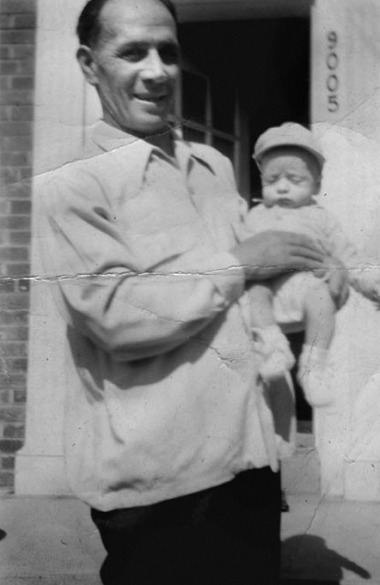I think about my grandfather a lot even though I never really knew the man. Joe Galeano from Sicily. I have this one picture of the two of us together, taken on the front stoop of the house in the Maryland suburbs he and my grandmother had just bought. The house was not only an improvement in their living space, but a symbol of upward mobility for these southern Italian immigrants.
He worked for my grandmother’s brothers who did stuccdatore – ornamental plastering – and they had contracts to work on new government buildings in downtown Washington. My grandmother was a gifted seamstress who made suits for Franklin Roosevelt and robes for the Supreme Court Justices. Her boss, Jimmy Bello, ran numbers out of the tailor shop.
My grandfather died from Rocky Mountain spotted fever he’d contracted from a tick bite. It was late July, 1948; two or three months after the photograph was made. I was his first grandson, the only one he ever knew, and I love how the photograph communicates protectiveness and pride through his gesture and pose.
I’ve read that a tick can live twenty years waiting for a warm-blooded host and that one in a thousand carry the infection. That means this particular lethal tick could have hatched when my grandfather was in his thirties - working with his in-laws, raising his children, moving out of the city to the suburbs, and sending money back to the old country.
His family had been in Sicily forever, through centuries of invasions, poverty, and lack of opportunity. It’s why he and his brother, and millions like them, left - never again seeing their families or homelands. In my grandfather’s case, just as he was experiencing success, represented by a new home and new grandson, he convulsed for four days and died. He was buried in Arlington Cemetery in a land he had only known for thirty-five short years, barely enough time to know a place.


